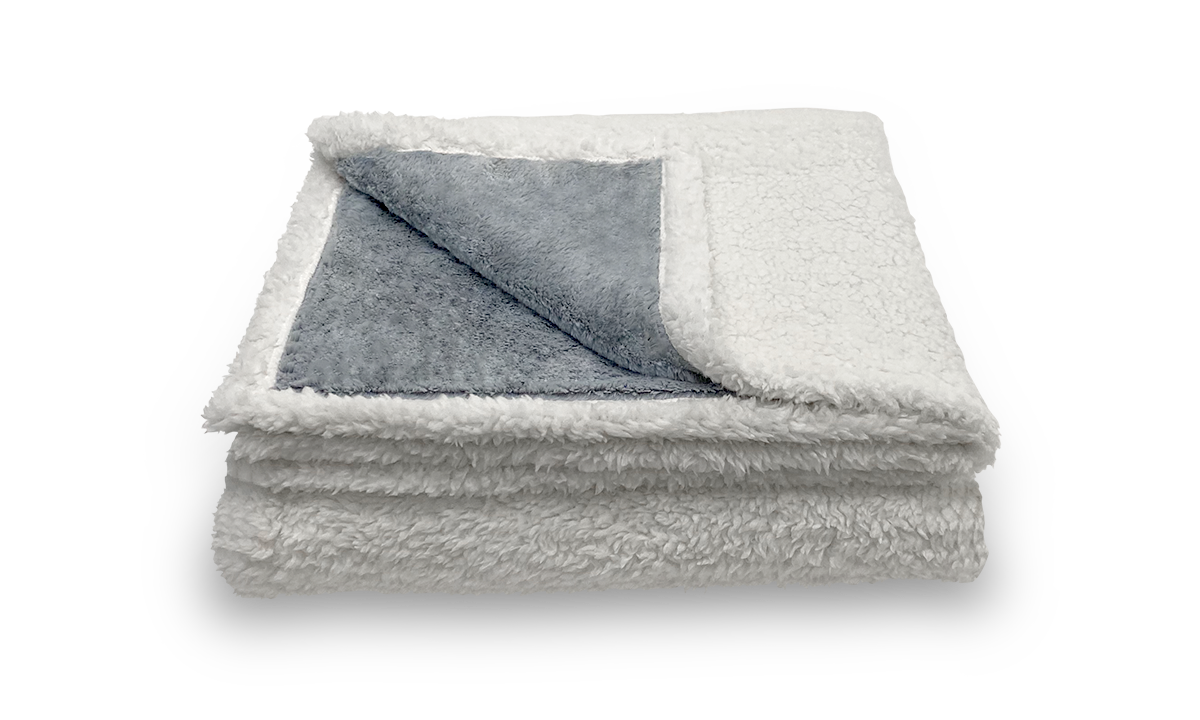Finding the right sleep aid can be transformative for your health and well-being. Compression sheets and weighted blankets are two such aids, each offering unique benefits to enhance sleep quality.
This blog explores the differences between compression sheets and weighted blankets to help you decide which might be the best fit for your sleeping needs.
Compression Sheet vs Weighted Blanket: Key Differences
Compression Sheets: Snug Comfort Without the Weight
Compression sheets, often crafted from stretchy materials like spandex or Lycra, are designed to wrap tightly around the mattress, creating a snug fit that exerts gentle, even pressure across the body.
This type of blanket is particularly favored for its ability to offer sensory pressure without significant weight, making it an ideal choice for those who feel claustrophobic under heavy blankets.
- Material and Function: The elastic material allows the sheet to stretch over the bed and hug the body closely, mimicking a gentle embrace that can soothe the nervous system.
- Targeted Audience: Especially beneficial for individuals with sensory processing difficulties, such as those on the autism spectrum, as the pressure can help reduce anxiety and improve sleep quality.
- Breathability and Comfort: Unlike weighted blankets, compression sheets are typically lighter and more breathable, making them suitable for use in warmer climates or for sleepers who tend to overheat at night.
Weighted Blankets: Deep Pressure for Enhanced Relaxation
Weighted blankets are heavier than standard blankets, filled with materials like fine glass beads or plastic pellets to add weight. This weight is distributed evenly across the blanket, applying what is known as deep pressure stimulation, a therapeutic method known to aid relaxation and reduce anxiety.
- Deep Pressure Stimulation: By applying firm, gentle pressure across the body, weighted blankets help increase serotonin and melatonin levels (which aid relaxation and sleep) and decrease cortisol levels (associated with stress).
- Variety and Customization: Available in various weights and sizes, these blankets can be customized to individual preferences, generally recommended to be about 10% of the user’s body weight.
- Therapeutic Benefits: Highly regarded for their benefits in managing anxiety, insomnia, ADHD, and other sensory-related conditions, weighted blankets provide a sense of security that can significantly improve sleep quality.
Enhance your relaxation routine with a compression sheet or weighted blanket, and transition seamlessly to a Puffy Lux Mattress for an unmatched sleep experience. The mattress complements the gentle pressure or soothing weight, helping to soothe your body into a deeper, more restful sleep.
One million Americans are sleeping better with Puffy. Compare our award-winning mattress collection against other brands to learn why: Puffy vs Purple, Puffy vs Nectar, Puffy vs Casper, Puffy vs Leesa, Puffy vs Saatva, Puffy vs Dreamcloud, and Puffy vs Tuft & Needle.
Comparing Benefits: Compression Sheet or Weighted Blanket?
Deciding whether a compression sheet or a weighted blanket is better suited to your needs depends on several factors, including personal comfort, specific health conditions, and environmental preferences. Here’s a deeper look at how to choose between the two:
Consider Your Sensory Preferences
- Sensitivity to Weight: If you are sensitive to heavy weights or prefer not to feel overly confined, a compression sheet may be the better option. Its snug fit provides sensory pressure without the heaviness associated with weighted blankets.
- Need for Warmth: If you prefer additional warmth while sleeping, a weighted blanket might be more suitable. Its materials and design naturally provide more warmth, which can be comforting in cooler climates or for those who get cold easily.
Consider Your Health Needs
- Anxiety and Stress: If your primary concern is anxiety or stress, a weighted blanket may offer more significant benefits due to its proven effectiveness in increasing serotonin and melatonin levels.
- Sensory Processing Issues: For those dealing with sensory processing issues or conditions like autism, a compression sheet might provide a better solution as it delivers a firm, comforting pressure without the extra weight, which some may find restrictive.
Consider Maintenance and Care
- Ease of Cleaning: Compression sheets are generally easier to maintain as they can often be washed and dried at home without special considerations. Weighted blankets, on the other hand, may require more careful cleaning procedures, especially if they are particularly heavy or filled with materials that need to be evenly maintained.
- Durability: Both options are designed to be durable, but the longevity of a weighted blanket can be influenced by the quality of materials used and the care taken during washing and use.
Pairing either a compression sheet or a weighted blanket with a Puffy Lux Mattress can optimize your sleep setup. The mattress provides excellent support and comfort, enhancing the effects of the sleep aid, whether it’s the snug fit of a compression sheet or the soothing weight of a blanket.
Introducing a compression sheet into our family’s routine has been particularly beneficial for my child with sensory issues, providing the needed comfort to ensure a restful night.
Meanwhile, my own experience with a weighted blanket has significantly improved my sleep quality, helping me to fall asleep faster and wake up feeling more refreshed.
Conclusion
Both compression sheets and weighted blankets offer substantial benefits for improving sleep. Your choice between the two should be based on personal comfort preferences, specific health needs, and environmental considerations.
By understanding the distinct advantages of each, you can make a more informed decision that best suits your lifestyle and enhances your nightly rest.

- Oeko-Tex® Standard 100 certified.
- Hypoallergenic.
- Lifetime warranty.
- 101-night sleep trial.
- Free shipping and returns.












